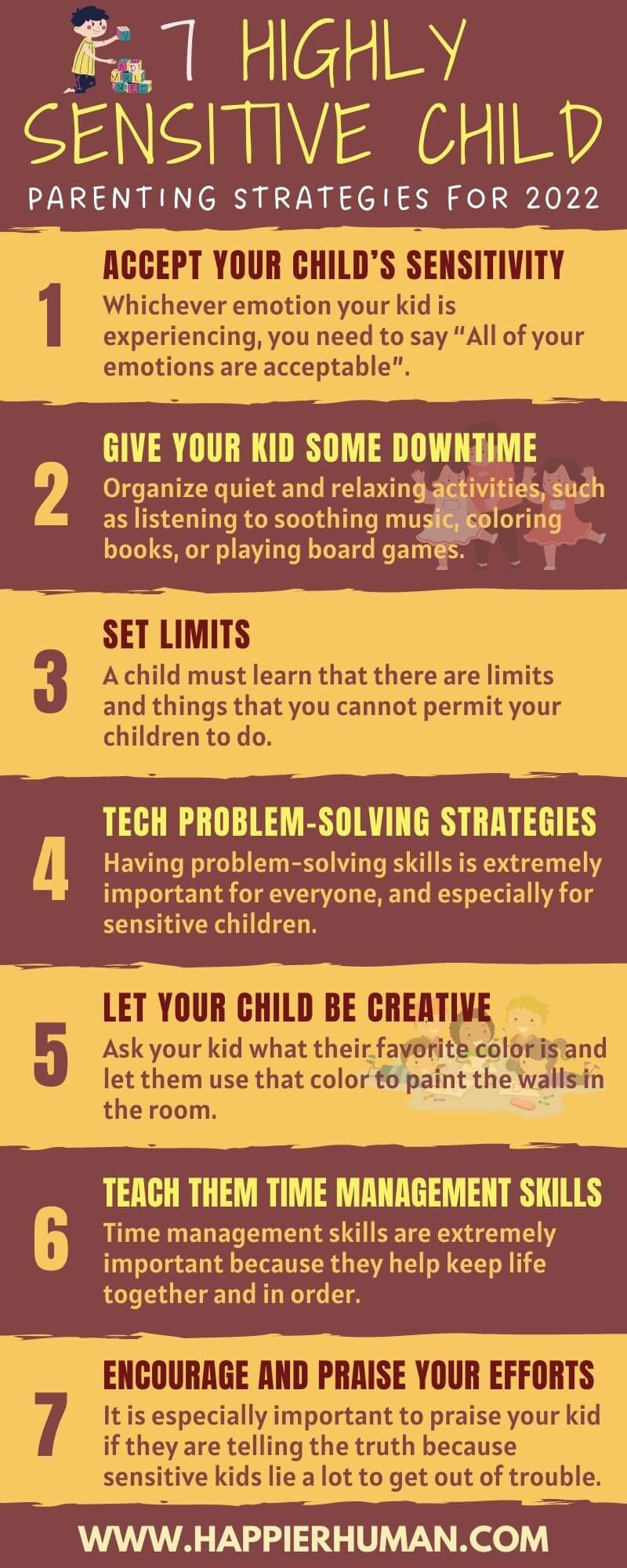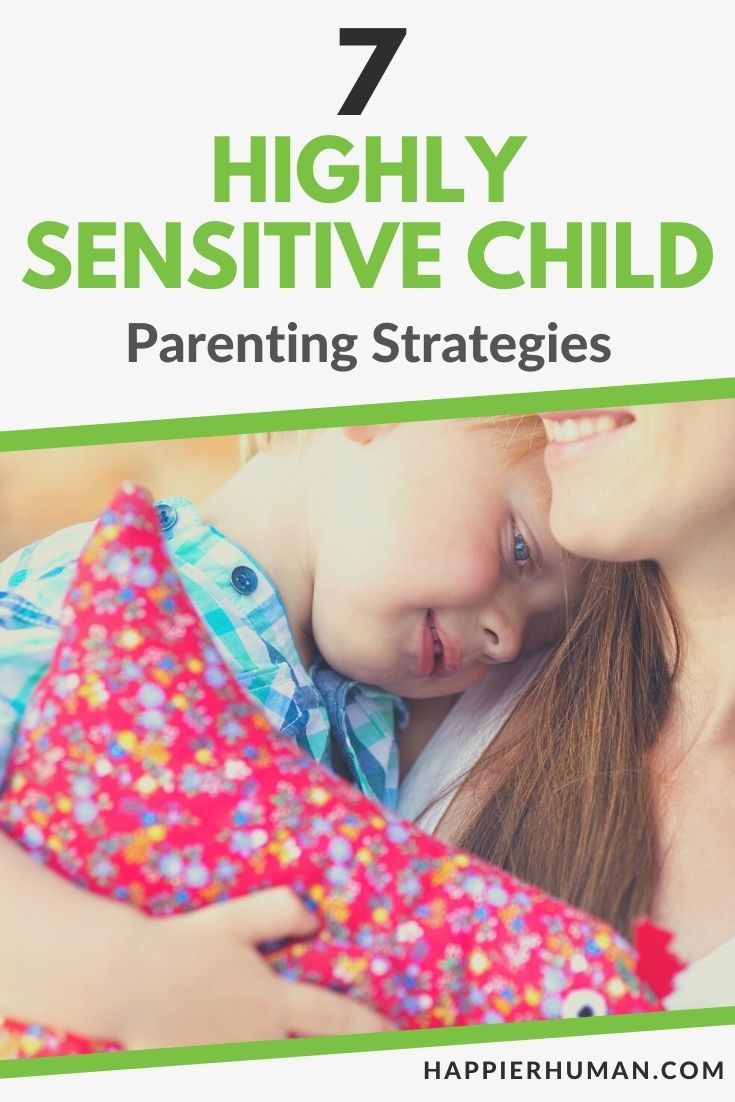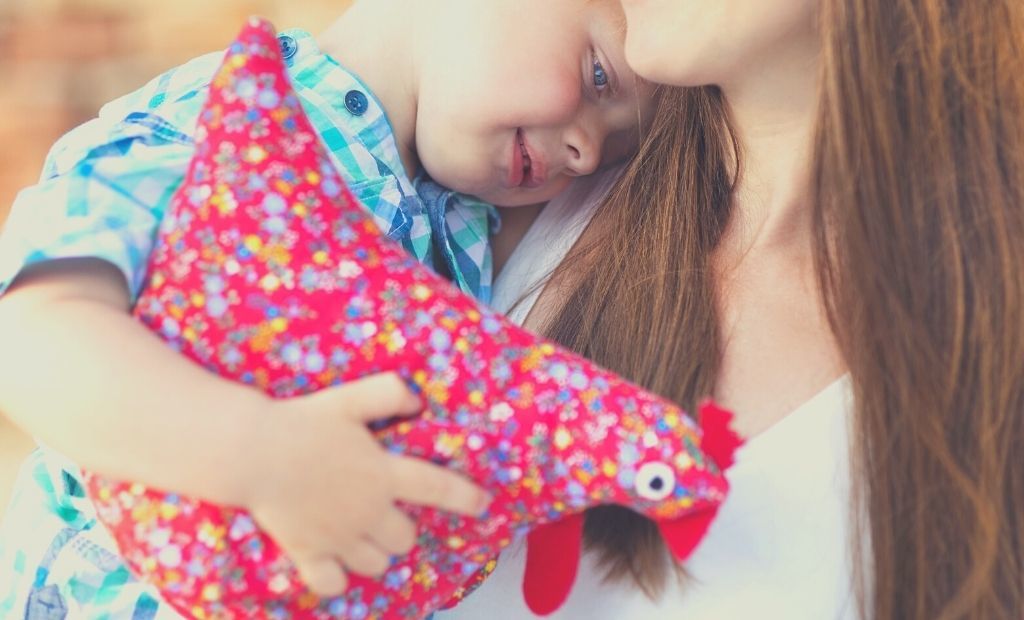There might be affiliate links on this page, which means we get a small commission of anything you buy. As an Amazon Associate we earn from qualifying purchases. Please do your own research before making any online purchase.
Are you struggling with your highly sensitive child?
If so, then in this article we will talk about 7 specific parenting strategies that you can use with your child and explain how to use them.
But first, let’s start with a quick definition.
(Side note: Want to level up your parenting skills? Then check out this resource that will show you how to get your kids to listen WITHOUT yelling, nagging, or losing control)!
What You Will Learn
- What is a Highly Sensitive Child?
- 1. Accept your child's sensitivity
- 2. Give Your Kid Some Downtime
- 3. Set limits
- 4. Tech problem-solving strategies
- 5. Let your child be creative
- 6. Teach them time management skills
- 7. Encourage and praise your efforts
- Final Thoughts On Highly Sensitive Child Parenting Strategies
What is a Highly Sensitive Child?
A highly sensitive child is born with a sensitive nervous system that quickly reacts to everything. Such kids are able to pick up sights, smells, sounds, and feelings that other kids are not affected. For this reason, highly sensitive children often overreact and get overwhelmed.
You may question yourself “Is my child highly sensitive?”. Here is a list of signs:
Being a parent of this child is not the easiest task, and it may be quite exhausting for parents. As a former highly sensitive child, I know that my parents struggled greatly.
The good news is there are highly sensitive child parenting strategies that will help you better understand the needs of your kid and establish trusting relationships.
1. Accept your child's sensitivity
Acceptance is one of the first steps to success. For some reason, many parents do not want to accept the fact that their child is highly sensitive. They consider their sensitivity as a disease and therefore do not want to admit that the child is sick.
However, they were born this way, and you cannot change them. All you can do is support them the way they are. Do not try to change your child's temperament and discourage them from expressing their feelings. Instead, try to teach them how to deal with their emotions, both negative and positive.
Whichever emotion your kid is experiencing, you need to say “All of your emotions are acceptable”. There are also other positive affirmations you can use to build your kid's confidence and help them deal with their emotions better.
In our modern society, some emotions, such as anger, anxiety, and hurt are often judged as “unhealthy”. You need to let your child know this is not true, and experiencing these emotions are totally normal.
If you let your child experience these emotions without being told that these emotions are bad, they can benefit in a really powerful way. Then you will be able to transform these negative emotions into creating fuel that your kid will use later to perform something constructive.
2. Give Your Kid Some Downtime
Sensitive children get overwhelmed by many things, including large crowds, chaotic and loud environments, and bright lights. These kids need some downtime. Therefore, you should avoid overscheduling your kid. Make sure that they do not have too many extracurricular activities and spend more time at home – in a safe environment.

Organize quiet and relaxing activities, such as listening to soothing music, coloring books, or playing board games. As a highly sensitive child myself, I must say that these kids need some time alone, so they can recharge their “batteries”.
3. Set limits
As a parent, you probably do not want to upset your sensitive child, but constant exceptions are not at all helpful. Your child still needs to know that there are certain limits. Do not overlook inappropriate behaviors and actions in order to simply maintain peace. A child must learn that there are limits and things that you cannot permit your children to do.
Yes, you still need to be flexible but do not forget about discipline because it is what helps children to become responsible adults in the future. If there is no discipline in your family, children will not be ready for the real world. Skipping discipline also means that you do not allow your sensitive kid to learn and understand the consequences of their actions.
For this reason, make sure that you set limits and do not allow your child to break the rules. Here is a list of discipline strategies that you can use in your family.
4. Tech problem-solving strategies
Very often, highly sensitive kids may feel overwhelmed by different situations and be unable to find a solution. It is your job as a parent to teach them how to find the right solutions and deal with stress and anxiety.
Having problem-solving skills is extremely important for everyone, and especially for sensitive children. Their adult life will be much easier if they know how to solve problems. Many parents make the same mistake – they solve their kids' problems themselves, which is absolutely wrong.
Yes, I know that you want to help your child. However, the best way to help them is not to solve their problems but to teach them tools and strategies, so they are able to do it themselves.
Here is a step-by-step instruction on how to teach your child a problem-solving strategy:
5. Let your child be creative
As mentioned above, sensitive kids are very sensitive to their environment. They notice and feel smells, sights, sounds, and touch more than other kids. For this reason, one of the most effective strategies that you can try is letting your kid be creative.
For example, you can let them organize their room the way they want, so it is comfortable for them. The room of your child is like a retreat or sanctuary where they can recharge themselves and hide from the rest of the world. Ask your kid what their favorite color is and let them use that color to paint the walls in the room. If there is any pillow or cover they really like, let them have it – it will add comfort and make their “shelter” cozier and more comfortable.

By using this strategy, you do not only help your highly sensitive child, but also let them exercise innate creativity. When they are adults, developed creativity will be really helpful and can be used in many different life aspects. For example, when your kid is an adult, he or she will be able to use creativity for visualization techniques to create a better life. Moreover, this strategy also gives them their personal gateway to make themselves feel happy and satisfied.
6. Teach them time management skills
Highly sensitive kids get stressed easily, especially when there are a lot of things to do. For this reason, the first years in school may be quite challenging for your kid. I know that you would like to help your child, and the best way to do it is to teach them time management skills.
They need to learn how to follow a certain schedule and be consistent with it. It should not be too hard because most sensitive kids enjoy routine. Moreover, good time management skills do not allow children to develop a “dangerous” habit of procrastination.
There was research made in 1999 that has proven there is a link between academic anxiety and procrastination, and anxiety is one of the main threats to sensitive kids. Therefore, it should be avoided. Show them how to handle and finish their homework and extracurricular activities the same day, without any delay.
In order to help your kid, you can show them how you are able to manage your own work schedule. Time management skills are extremely important because they help keep life together and in order.
7. Encourage and praise your efforts
Highly sensitive kids are usually not confident enough, and they need plenty of encouragement. Make sure you praise your child's efforts, even if they were not successful and have not brought positive results. You can use the quotes of famous people about self-esteem and self-confidence as inspiration to praise your sensitive child.
However, do not praise for no reason. Several studies show that children who are always praised for no reason have lower self-esteem than those kids who are praised intermittently. According to the research published in Child Development (Netherlands) November/December 2017 volume 88, if parents praise their kids too much and too often, it has a damaging effect on their self-esteem.

Exaggerated praise can feed a burgeoning narcissism. There are many public figures who are narcissistic, which has an impact on how they interact with other people and their staff.
When you praise your sensitive kid, you should praise your kid's efforts rather than the results of their efforts. For example, if your kid is struggling with math, you can say “I like how you keep trying hard and are not giving up”. You are pointing out that hard work and efforts are worthy of praise, even if they are not perfect and do not bring any results.
If you see that your child is upset, here is a list of words of encouragement you can use to make them feel better. It is especially important to praise your kid if they are telling the truth because sensitive kids lie a lot to get out of trouble.
Final Thoughts On Highly Sensitive Child Parenting Strategies
Yes, raising a sensitive child is not easy – as a parent, you may have to do many things differently. You should understand that these kids have special needs that need to be taken care of. Your mission is to give your sensitive kid all confidence and comfort they need.
By using highly sensitive child parenting strategies, you can help your sensitive kid to thrive in this world and succeed with their specific trait and unique personality.
Finally, you can also check this article out with the list of TED talks for kids that will help enrich the life of your sensitive child.
Finally, if you want to level up your parenting skills, then check out this resource that will show you how to get your kids to listen WITHOUT yelling, nagging, or losing control.


